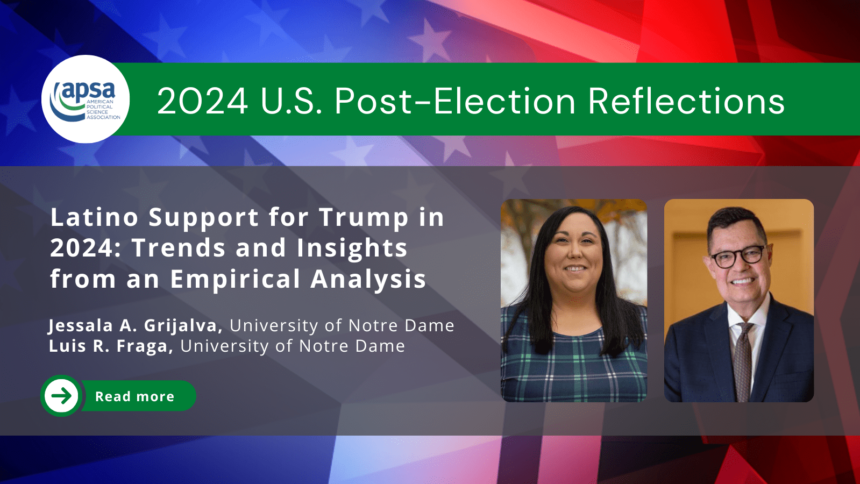| Prior to the 2024 US Presidential Election, APSA’s Diversity and Inclusion Programs Department issued a call for submissions, entitled “2024 APSA Post-Election Reflections,” for a PSNow blog series of political science scholars who reflect on key moments, ideas, and challenges faced in the 2024 election. The views expressed in this series are those of the authors and contributors alone and do not represent the views of the APSA. |
Latino Support for Trump in 2024: Trends and Insights from an Empirical Analysis
by Jessala A. Grijalva, Institute for Latino Studies, University of Notre Dame, and Luis R. Fraga, University of Notre Dame
Understanding Latino political behavior requires moving beyond conventional models. Our study introduces an innovative framework that captures the complexities of Latino voter alignment, offering new insights into why segments of this electorate have increasingly supported Donald Trump over multiple election cycles.
One of the most puzzling trends in contemporary American politics is the growing support for Donald Trump among a subset of Latino voters—particularly in the 2024 election—despite Trump’s past implementation of policies and use of rhetoric widely perceived as hostile to Latino communities. For example, during his 2015 presidential campaign announcement, he described Mexican immigrants as “rapists” and criminals. Theories of political behavior such as linked fate and perceived threat predicted that Trump’s targeting of Latinos and immigrant communities would mobilize Latino voters against him, fostering collective opposition. However, instead of widespread resistance, support for Trump among segments of the Latino electorate grew from 2020 to 2024 over successive election cycles, challenging these conventional understandings of Latino political behavior.
This study directly confronts this paradox, offering a data-driven reassessment of how identity, ideology, and coalition-building interact within Latino communities. By employing a hybrid methodological approach, we provide empirical clarity on the evolving role of Latino voters in shaping electoral outcomes and challenge assumptions about their political alignment.
One of the most puzzling trends in contemporary American politics is the growing support for Donald Trump among a subset of Latino voters—particularly in the 2024 election—despite Trump’s past implementation of policies and use of rhetoric widely perceived as hostile to Latino communities.
Much of the current discourse surrounding Latino support for Trump, however, remains speculative and heavily reliant on anecdotal evidence. Prominent media narratives frequently draw on problematic data sources such as exit polls, which are characterized by methodological flaws—including sampling biases, oversimplified demographic categories, and insufficient representation of diverse Latino subpopulations. These limitations underscore the persistent lack of a nuanced understanding of Latino political heterogeneity, an enduring challenge for researchers.
Our research investigates a central question: What explains the growing Latino support for Trump as reflected in the 2024 election? To answer this, we leverage data from the Comparative Multi-Racial Post-Election Survey (CMPS) and employ innovative analytical methods, including a hybrid approach combining descriptive statistics, Classification and Regression Trees (CART), and Qualitative Comparative Analysis (QCA). Adopting a data-driven and exploratory approach, this research aims to uncover the underlying dynamics shaping this trend while minimizing assumptions. Instead, it relies on rigorous methods that allow the data to guide the analysis, which provide meaningful and empirically grounded insights.
In doing so, we contribute to broader conversations about the shifting political behavior of Latino communities, shedding light on the evolving intersections of group identity, partisan realignment, and electoral coalition-building in the 2024 election cycle.
Our research makes critical contributions to the study of political behavior, Latino politics, and methodological innovation in political science, offering fresh insights into electoral trends, theoretical frameworks, and research design.
Proposed Research Framework
Our research investigates the growing Latino support for Donald Trump across the 2016, 2020, and 2024 elections, leveraging longitudinal data to analyze patterns of continuity and change. By examining how factors such as political identities, partisanship, ideological leanings, and support for Trump evolve across these three election cycles, this research aims to identify shifts within the broader coalition of Latino voters.
We employ a hybrid methodological approach that integrates CART and QCA to identify, validate, and interpret the factors driving Latino political behavior. CART detects patterns across a wide range of variables such as demographic characteristics and policy preferences. These patterns highlight the predictors most strongly associated with outcomes such as support for Trump, political identity formation, and coalition alignment. QCA will complement this analysis by testing whether CART’s identified predictors are reliable and examining how combinations of factors create causal configurations that produce specific outcomes.
The CMPS dataset is integral to this framework. Its large sample size, detailed demographic data, and multi-cycle coverage allow us to trace how political identities and coalitional dynamics within the Latino electorate have shifted over time.
Potential Contributions
Our research makes critical contributions to the study of political behavior, Latino politics, and methodological innovation in political science, offering fresh insights into electoral trends, theoretical frameworks, and research design.
First, our research provides a nuanced analysis of Latino voters, emphasizing their diversity and challenging traditional theories of political behavior such as linked fate and perceived threat. While traditional theories predict collective mobilization in response to hostile policies and rhetoric, they fail to fully account for the growing Latino support for Trump—a candidate widely perceived as threatening to Latino communities. By exploring this unexpected trend, the study advances theoretical understanding of group identity and its limitations, pushing the discipline toward more flexible and intersectional frameworks.
Second, the project serves as a model for exploratory research, showcasing how non-parametric data-driven approaches can uncover meaningful insights into electoral behavior. Our study’s hybrid use of CART and QCA represents a major methodological advancement in political science. This integration is particularly valuable for understanding counterintuitive trends, such as Latino support for Trump, while minimizing assumptions and laying the groundwork for broader adoption of these methods.
Our framework offers a new way to conceptualize these dynamics, challenging existing theories and refining our understanding of Latino political alignment. As this is a work-in-progress, we look forward to further refining our findings and engaging in continued scholarly discussion.
Third, our research moves beyond anecdotal accounts and unreliable exit polls by leveraging the rigor and breadth of the CMPS dataset. By analyzing data from three pivotal election cycles—2016, 2020, and 2024—this research provides a robust, longitudinal perspective on Latino voter behavior. This approach captures both stability and change within the Latino electorate, offering insights into how political identities and preferences evolve.
Overall, our research seeks to contribute to broader debates about partisan realignment in U.S. politics by examining how Latino voters, historically viewed as strongly aligned with the Democratic Party, may be increasingly engaging with Republican candidates and conservative ideologies. By situating Latino voter behavior within the context of shifting electoral coalitions, this research highlights the growing complexity of Latino political engagement and underscores the importance of moving beyond simplistic assumptions about their partisan loyalties and political behavior.
Conclusion
Our research highlights the urgency of adopting innovative approaches to understanding the complexities of Latino political behavior in the context of the 2024 election. By moving beyond anecdotal narratives and employing rigorous, data-driven methods, this research seeks to examine the evolving role of Latino voters in shaping electoral outcomes. The increasing heterogeneity within the Latino electorate requires frameworks that not only reflect its diversity but also account for the dynamic intersections of identity, context, and preferences that drive political behavior.
Our framework offers a new way to conceptualize these dynamics, challenging existing theories and refining our understanding of Latino political alignment. As this is a work-in-progress, we look forward to further refining our findings and engaging in continued scholarly discussion. Future analyses will deepen our exploration of key electoral trends, offering additional insights into the evolving nature of Latino political behavior.
Dr. Jessala A. Grijalva is a political scientist whose research explores the complexities of Latino political behavior, identity, and social psychology. Her dissertation introduced the Multidimensional Latino Acculturation Model (MLAM), which recognizes hybrid acculturation orientations ignored by dominant frameworks, reshaping how scholars understand Latino acculturation and its influence on political attitudes and identity. A Post-Doctoral Research Associate at Notre Dame’s Institute for Latino Studies, she uses innovative methodologies to examine shifts in group identity and partisan dynamics. She co-leads the “Re-envisioning Multiracial Democracy” initiative and advances nuanced understandings of Latino political behavior.
Luis R. Fraga is the Rev. Donald P. McNeill, C.S.C. Professor of Transformative Latino Leadership, the Joseph and Elizabeth Robbie Professor of Political Science, and Director of the Institute for Latino Studies at the University of Notre Dame. His research focuses on voting rights, the politics of race and ethnicity, immigration policy, and democratic inclusion. Dr. Fraga has authored or co-edited six books and published extensively in top-tier journals, such as American Political Science Review and The Journal of Politics. He has served as Vice-President of the American Political Science Association and held leadership roles in various national commissions.












